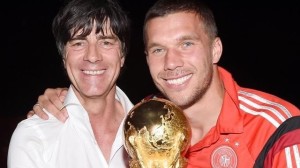
What lessons can be learnt from the successful German Football campaign?
As the dust settles on Germany’s recent FIFA World Cup triumph is there anything that those side’s hoping to lift the Rugby World Cup crown in England next year could learn from Joachim Löw and his all-conquering team?
Are there lessons that could prove pivotal for those sides aiming to win the Women’s Rugby World Cup in France next month?
Continuity in coaching
Löw enjoyed an extensive playing career in German football before embarking on what was not always a successful coaching career at club level with sides including Stuttgart and Fenerbahce. His career received a notable boost following the appointment of Jurgen Klinsmann as Germany coach who wasted no time in inviting an old friend from his coaching training to work alongside him as his assistant.
They took charge of a side that had failed to win a game at the 2004 European Championship under the guidance of Klinsmann’s former international team-mate Rudi Voeller and would go on to oversee a radical revamp of the national side and its approach to the game.
The combination of Klinsmann’s leadership and Löw’s tactical prowess drew rave reviews and together they steered the Germans to the 2006 World Cup semi-finals. Klinsmann chose not to continue and Löw was subsequently handed the reins and vowed to continue down the same path with newly-appointed assistant Hans-Dieter Flick.
The faith of the Deutscher Fussball-Bund was eventually rewarded this month at which point Löw paid tribute to his predecessor: “We started this project 10 years ago and what has happened today is the result of many years’ work, starting with Jurgen Klinsmann,” he told told FIFA.
The age factor
Veteran stiker Miroslav Klose turned 36 at the beginning of June but was still a key figure in Germany’s success in Brazil. His goals against Ghana and Brazil were not only vital but also took his World Cup finals tally to 16 and past the all-time leading mark of former Brazil striker Ronaldo. One of four cap centurions to appear in the victory over Argentina, he was also by no means a bit part player having started Germany’s quarter-final and semi-final in addition to the final.
England coach Stuart Lancaster is striving for the perfect balance between youth in experience for their Rugby World Cup assault next year having injected a host of fresh faces at the expense of some older heads when he first took charge of the national side. It is hoped that his squad will boast a winning blend come next year’s tournament but could he live to regret the jettisoning of such experience? New Zealand embarked on their victorious 2011 Rugby World Cup campaign with 10 players who had already won 50 Test caps while the last England squad included just two players who had reached a half century – hooker Dylan Hartley and flanker James Haskell – with only a couple more likely to join them between now and the big kick off.
A willingness to embrace change
Germany reached the 2002 World Cup final, where they were beaten by Brazil, but their appearance in the title decider was seen as surprising coming as it did in the middle of a notable slump that saw them bow out of the European Championships at the pool stage in both 2000 and 2004.
Klinsmann was handed the top job by the DFB in the wake of the latter tournament despite not having any experience of coaching at club level and he immediately set about a revolution based on an attacking philosophy and the development of youth players.
He also demanded that the national domestic league – the Bundesliga – also fell into line with clubs told to support the effort to nurture younger, fitter and better skilled players. Youth academies became mandatory while mobile coaching units were deployed around the country to spread the word to schools and grassroots clubs.
The performances at the 2006 World Cup offered just as much reason for hope as the semi-final appearance itself and a narrow defeat to Spain in the 2008 European Championship final was another major step in the right direction with Löw by that stage in charge of the side. Further evidence that they were on the right track came at the 2009 UEFA U21 Championships where a Germany side including several future World Cup winners tasted success.
Yet more progress was evident despite a semi-final defeat to Spain at the 2010 World Cup and there was more knock-out agony at Euro 2012 with a semi-final defeat to eventual winners Italy but there was no stopping them this summer with Klinsmann’s USA among the scalps they took on their way to the sport’s biggest prize.
Make yourself at home
Germany generated almost as many headlines for their efforts off the field as they did on the pitch thanks largely to the Campo Bahia training base in the fishing village of Santo Andre that they called home for the duration of the tournament.
Not satisfied with the options provided by FIFA, the DFB persuaded tournament organisers to allow them to use a purpose-built resort that was redeveloped by German businessman Christian Hirmer and subsequently leased by the national side.
The DFB shunned existing facilities and bigger cities in order to ease the travel burden on their players and in the hope of forging a ‘winning team spirit’ and avoiding the inter-club divisions that reportedly blighted previous campaigns. “It was the perfect solution, as far as us players are concerned,” striker Thomas Mueller told reporters after his side’s final triumph.
Locals were initially concerned by an increased security presence surrounding the team’s island base but these fears were soon allayed and they were soon won over by a squad determined to reach out to the community and an investment that is set to provide a jobs and income long after the Germans have gone.
Nearest and dearest
If some headlines are to be believed, the wives and girlfriends of the German players were a key factor in their World Cup victory. Never too far away from action, the players or the cameras, the support that they offered was acknowledged by the squad following their final triumph with match-winner Mario Gotze among those to admit he ‘owed a lot’ to his family and friends.
Gotze’s model girlfriend Ann Kathrin Brömmel was a welcome visitor to the squad’s Campo Bahia base and she was not alone with Löw reportedly allowing the players’ nearest and dearest to visit regularly in a bid to enhance his own efforts to keep his squad happy, relaxed and primed for action.

Mario Godze (middle) and his girlfriend Ann Kathrin Brömmel (left)
In contrast, England coach Roy Hodgson stopped short of a complete ban but captain Steven Gerrard feared a repeat of the 2006 tournament where the ever-present WAGS proved ‘a bit of a distraction’ and therefore chose to keep his wife and family at a distance for what proved to be a brief stay in Brazil.
If a World Cup is won ten years in advance, who is shaping up as most likely to depose the All Blacks as world champions in 2015? How would professional rugby clubs react to a specific directive from their national bodies telling them to develop more younger players?